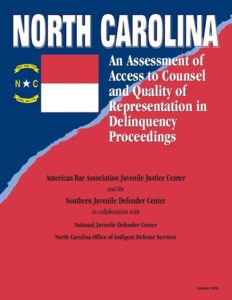North Carolina: An Assessment of Access to Counsel and Quality of Representation in Delinquency Proceedings (2003)
This assessment of access to counsel and quality of representation that children receive in delinquency proceedings in the State of North Carolina is part of a nationwide effort to address deficiencies and identify strengths in juvenile indigent defense practices. Over thirty-five years after the United States Supreme Court decided that children have a constitutional right to counsel, the spirit and promise of the Gault decision has been largely unfulfilled. With little exception, juvenile indigent defense practices have gone unchecked. The purpose of this assessment is to take a closer look at juvenile defense practices in North Carolina, identify the systemic and institutional barriers that impede the development of an improved legal service delivery system, highlight innovative practices, and offer recommendations for change.
Investigative team members encountered many devoted and talented lawyers for children throughout the North Carolina assessment. Despite the odds, these advocates provide remarkable legal services to children; their professionalism, commitment, and dedication were obvious. However, these instances of vigorous representation are the exception rather than the rule across the state. This assessment reveals gaps in juvenile indigent defense practices that should be addressed. The system as it is presently structured is, at best, uneven, and clearly has had a disproportionate impact on poor and minority children.

